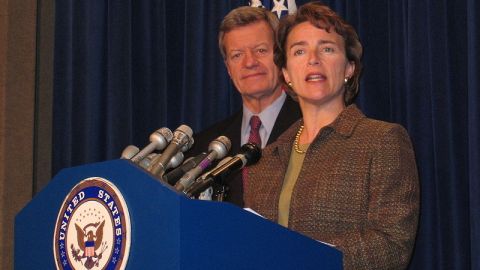Who Are Americans for Job Security?

Sen. Blanche Lincoln (D-AR) is in trouble. She is struggling to survive a primary challenge from Lt. Gov. Bill Halter. Now it looks like she may be headed to a runoff against her more liberal opponent—never a good sign in a conservative state like Arkansas. But unemployment in Arkansas is rising. And Lincoln has alienated progressive and labor groups with her vocal opposition to the public option and cap-and-trade legislation. Labor groups like the American Federation of State, County and Municipal Employees (AFSCME) and the Service Employees International Union in particular have spent millions of dollars on ads targeting Lincoln. But Lincoln has an ally in the form a mysterious group called Americans for Job Security.
Americans for Job Security has reportedly spent $1.5 million on ads targeting Halter for being on the board of a company which opened up offices in India to save money. The group’s television spot—which as I wrote last week is an example of a slate of new political spots playing on resentment of foreigners and immigrants—features Indians thanking Halter for creating jobs in India instead of in Arkansas. The group’s new mailer also thanks Halter in Hindi for sending jobs to Bangalore. Lincoln has denounced the ads as offensive, even though she distributed a similar mailer herself. But while the ads have a disturbing racial tinge, Americans for Job Security is certainly well within its rights to question whether Halter’s business dealings were appropriate.
What’s strange is that no one knows who’s behind this group that might sway the Arkansas primary in Lincoln’s favor. Americans for Job Security describes itself as an “independent, bi-partisan, pro-business issue advocacy organization.” It says it believes that free markets are essential to a strong economy—a view that’s hard to square with its protectionist attack on Halter. But it won’t discose where its money comes from, saying only that its supporters are “businesses, business leaders and entrepreneurs from around the country.” And it’s apparently run out of a P.O. box at UPS Store in Virginia. The group told Greg Sargent last week that, as a trade organization engaged in what’s known as “true issue advocacy,” it isn’t required to reveal the sources of its funding. Halter is suing the group anyway, on the grounds that its ads just attack his qualifications for office, and don’t address any actual policy issues. But by the time he can make that case, the primary will be over and the damage to his campaign will be done.
Should groups be allowed to finance political ads anonymously? In McIntyre v. Ohio Elections Commission, the Supreme Court upheld the right of individuals to distribute anonymous campaign literature. But it is not clear that the right to express oneself anonymously necessarily extends to corporations and groups. Although the court recently found in Citizens United v. Federal Election Commission that Congress can’t limit the amount corporations can spend on political ads, 8 justices agreed—only Justice Thomas dissented—that the government can require corporations to disclose they’re behind their ads. Now Democrats in Congress are considering making the disclosure requirements more stringent, to prevent corporations from running anonymous smear campaigns.
Americans for Job Security says that it doesn’t want the identity of its backers to keep voters from evaluating its message fairly. It’s certainly true that groups that are unpopular might have a hard time having their arguments get a fair hearing. But knowing who is behind an ad can actually help us to evaluate its message. It’s a safe bet that if cigarette companies support an anti-smoking ordinance, for example, that it actually weakens rather than strengthens the anti-smoking laws in place. Anonymous messages also allow corporations to avoid responsibility for the positions they take, and even to take a different positions publicly from the ones they advocate in private. I frankly wouldn’t want to admit I was behind Americans for Job Security’s ads either. But corporations and groups don’t face the same danger of persecution and harassment that individuals who hold unpopular opinions do. Maybe it would be better if we asked them take responsibility for the positions they take.





